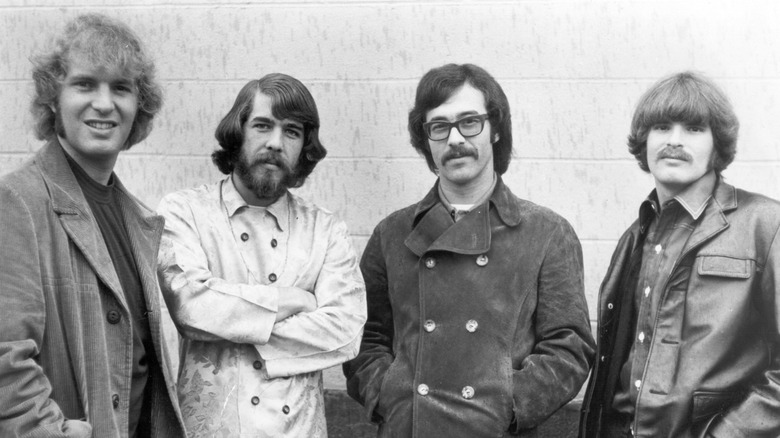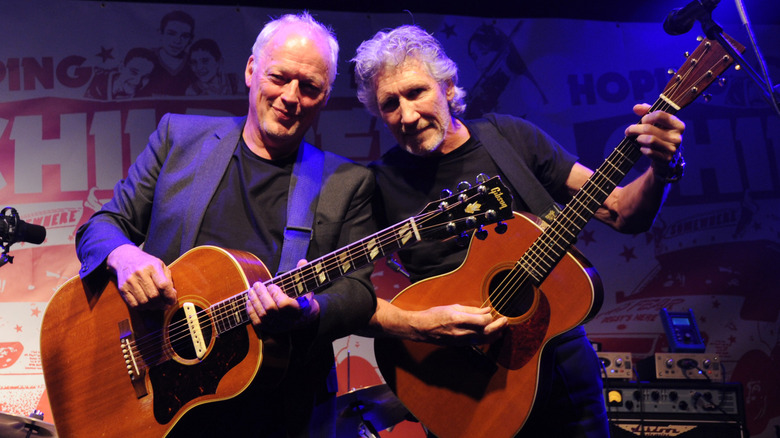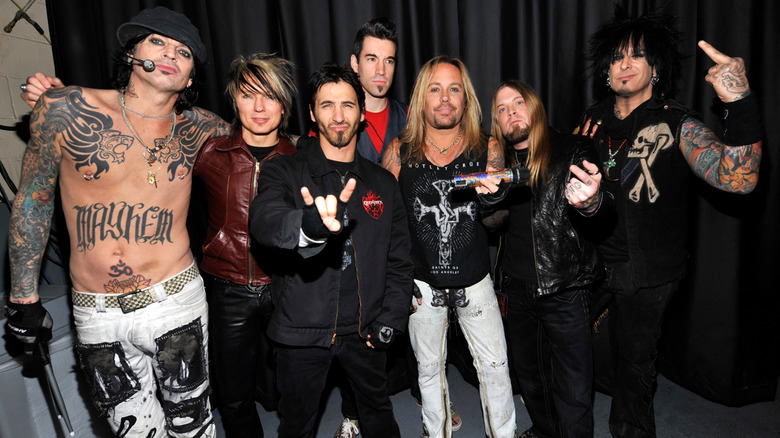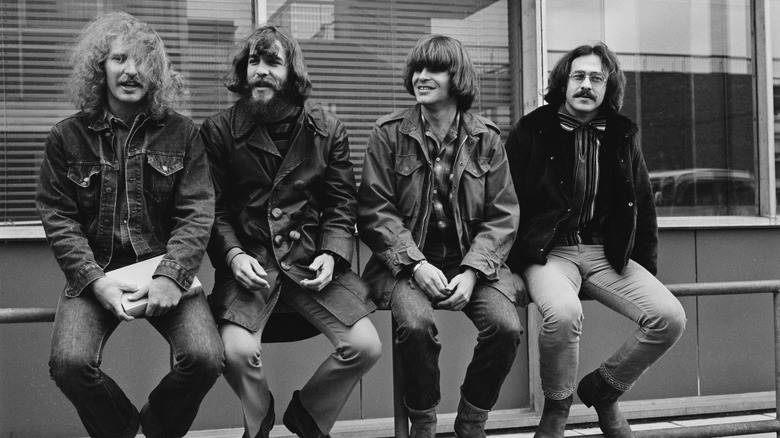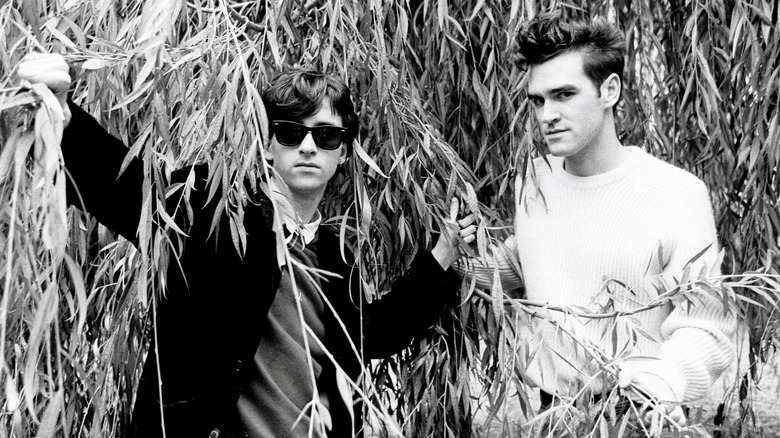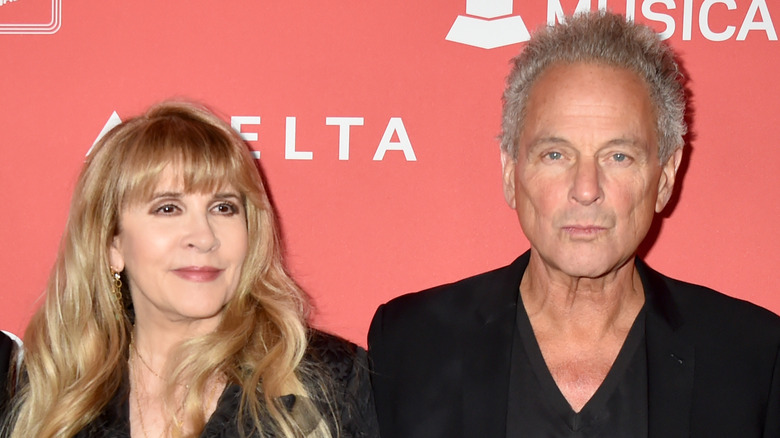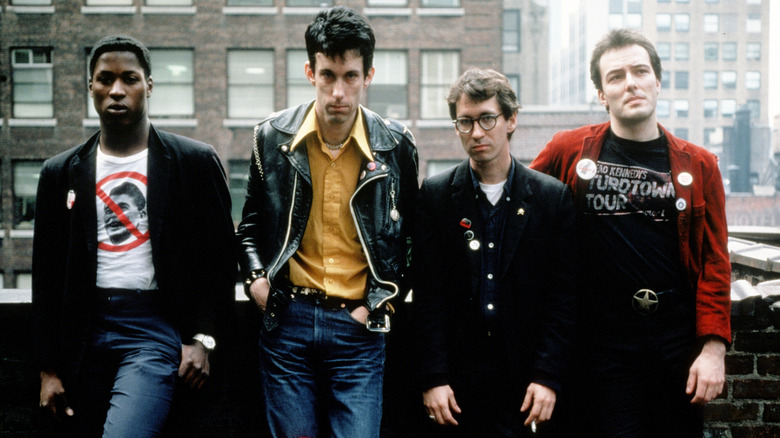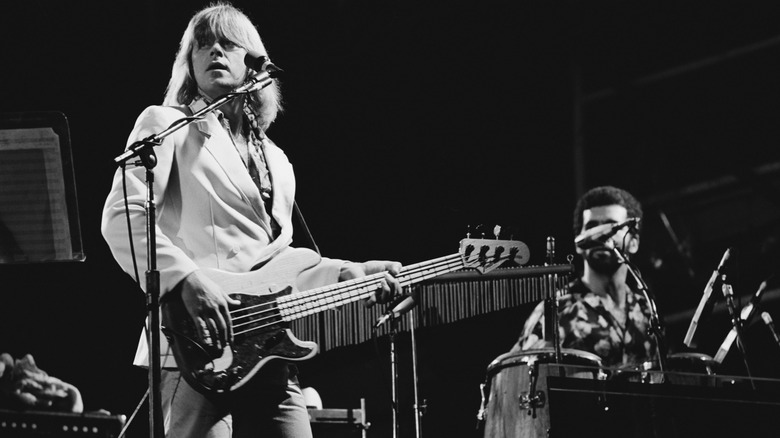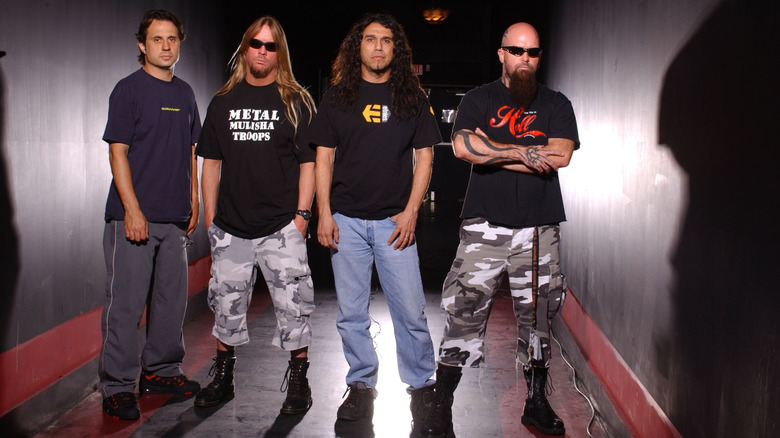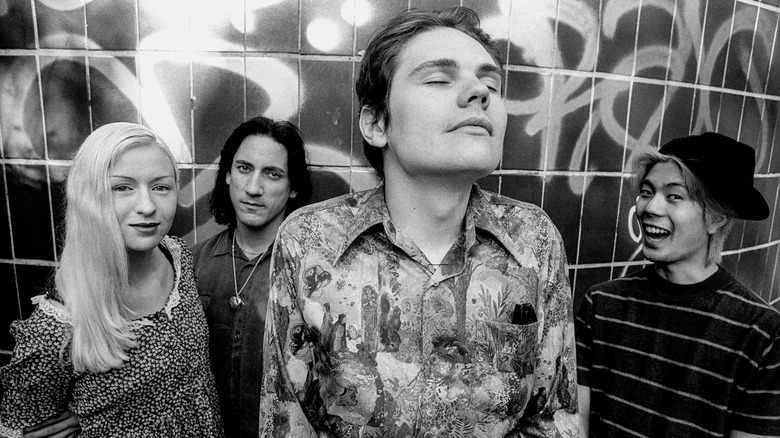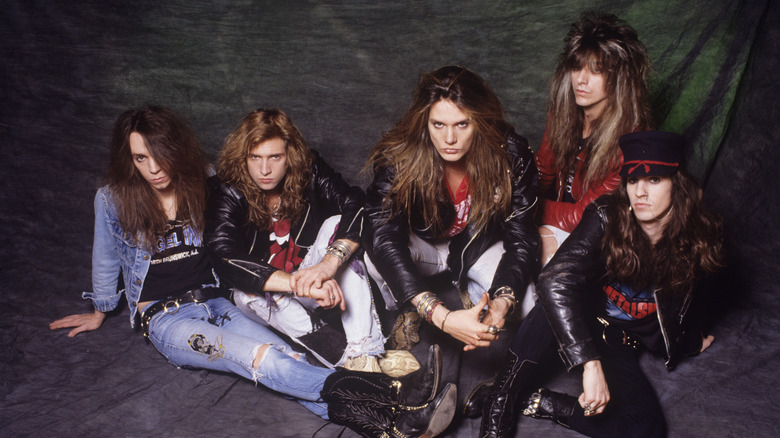Rock Stars Who Refused To Work Together
Great collaboration is often the secret ingredient for creating unforgettable rock music. Magic happens when talented musicians come together to share their vision and invest in a creative process that delivers infectious melodies and powerful stories to audiences around the globe. However, things like ego, money, creative control, personal conflicts, and even legal troubles can tear the collaborative jugular apart and end the most successful partnerships.
Unfortunately, many iconic acts have experienced falling-outs that turned cordial cohorts into bitter foes. These tiffs resulted in years of bad blood and brutal insults between rockers that changed career trajectories and marked turning points in their histories. While these musician feuds got out of hand, some folks eventually called a truce, like notoriously embattled brothers Liam and Noel Gallagher reuniting for an Oasis tour. Others still hold hard grudges against their former collaborators and reject any notion of reconciliation. From bandmates who clashed creatively to musicians who felt disrespected by their peers, the rock stars on this list refused to work together.
David Gilmour and Roger Waters
David Gilmour and Roger Waters were creative forces behind Pink Floyd, one of the most innovative bands to emerge in the 20th century. Gilmour's virtuosic guitar chops and Waters' lyrical prowess and conceptual vision defined Pink Floyd's progressive sound and shaped the creation of iconic albums like 1973's "The Dark Side of the Moon" and 1979's "The Wall." The English rockers experienced mega success but behind the scenes, Gilmour and Waters' relationship deteriorated due to artistic disputes and mounting personal tensions. The tipping point came when Waters left the band in 1985 and tried (but failed) to legally dissolve Pink Floyd after his exit.
Their relationship has been riddled with mutual disdain since Waters' departure from the band. While they've briefly tolerated one another for a few performances over the years (one in 2005 as Pink Floyd and another in 2011 for Waters' "The Wall" tour), it's clear that future collaboration is highly unlikely. The former bandmates have thrown serious jabs at one another in the press, battling over several issues like the future of Pink Floyd and their views on the Russia-Ukraine war.
The truth about Gilmour and Waters' infamous feud is that it shows virtually no sign of resolution. In July 2024, Waters told Reuters that he, Gilmour, and Pink Floyd drummer Nick Mason would not perform together again. And when asked in an October 2024 interview with The Guardian if he would perform on stage with Waters again, Gilmour delivered a firm "absolutely not."
Nikki Sixx and Sully Erna
A slew of stars can't stand Mötley Crüe bassist Nikki Sixx, including Godsmack frontman Sully Erna. Their feud started in 2009 when Godsmack joined the Crüe Fest 2 tour. Erna reportedly didn't like how Godsmack was treated on the tour, and Godsmack drummer Shannon Larkin told "Interviews From the Edge" in 2011 that the frustration stemmed from how Crüe's security interacted with the band.
The situation soured in 2010 when Godsmack released the song "Cryin' Like a B****." While Larkin thought of the song title after seeing former NFL quarterback Philip Rivers cry during a game, Erna wrote the lyrics, which were rumored to be about Sixx. Erna wouldn't confirm or deny the rumor, but Larkin shared in an interview with Wyoming radio station Rock 96.7 that "certain lines were certainly directed at Nikki."
The Sixx-Erna beef simmered for a few years but flared up in 2014 when Sixx claimed (via X, then known as Twitter) that Godsmack "begged" to be on his radio show to promote their new album. That negative sentiment escalated when Sixx took to his show to say, in part, "There's probably 15 festivals that Mötley Crüe is headlining, and if Godsmack's on 'em, we're not doing them" (via Loudwire).
As if that wasn't enough to squash any chances of Erna and Sixx mending fences, Erna had some scathing words to say about the bassist in a 2015 episode of The Jasta Show. When Sixx's name was brought up, he called the Crüe rocker "a d***" and said he "treats people like s***," among other colorful insults. Their feud has died down in the past decade, but there are no signs of an official truce or that the two will work together in the future.
John Fogerty and Creedence Clearwater Revival
Brothers John and Tom Fogerty, along with Stu Cook and Doug Clifford, made up Creedence Clearwater Revival, an influential band that crafted hits like "Fortunate Son" and "Bad Moon Rising." CCR saw huge success in the late '60s and early '70s thanks to their progressive and feel-good bayou sound, but fights over creative control tore the musicians apart. The Creedence Clearwater Revival breakup timeline started when Tom Fogerty left the band in 1971; the group called it quits a year later.
The decades following their breakup saw bitter legal battles, fractured relationships, and staunch refusal from John Fogerty to play CCR music or perform with his former bandmates. According to John's autobiography, "Fortunate Son: My Life, My Music," he was hurt that Tom, Cook, and Clifford sold their group voting rights to Saul Zaentz, the owner of Fantasy Records who already owned the rights to CCR's music — a situation that devastated John. The Fogerty brothers were still at odds when Tom died in 1990.
Three years after Tom's death, CCR was inducted into the Rock & Roll Hall of Fame and asked to perform at the ceremony. John refused to play with Cook and Clifford and, instead, performed with Bruce Springsteen and Robbie Robertson. John reflected on this decision in his memoir, writing, "I'm just not going to stand on a stage with those people, three in a row, play our songs, and be presented as a band — particularly because these guys just sold their rights in that band to my worst enemy." He also wrote about declining to perform with CCR at former President Bill Clinton's inauguration in January 1993.
The band hasn't officially performed together since Tom's wedding in 1980, and while an on-stage reunion is unlikely, things seem slightly better between the legendary rockers today. In a 2019 interview with Pop Matters, Clifford said he, Cook, and John Fogerty have a business relationship but "nobody's inviting anybody over for dinner."
Johnny Marr and Morrissey
The Smiths, composed of singer Morrissey, guitarist Johnny Marr, bassist Andy Rourke, and drummer Mike Joyce, burst into the mainstream in the '80s with their groundbreaking indie rock sound and poetically sullen lyrics. Morrissey and Marr shared songwriting duties, collaborating on hits like "There Is a Light That Never Goes Out" and "Heaven Knows I'm Miserable Now." However, despite the band's success and creative harmony, The Smiths decided to call it quits in 1987, with Marr parting ways with the band shortly before they officially broke up.
Several things led to The Smiths' demise, including a lack of effective management and Marr's desire to pursue different musical ventures. Marr and Morrissey's relationship has been strained since the band broke up, and they've turned down impressive paydays and outright refused to work together over the last few decades. Morrissey even went as far as to tell Uncut in 2006, "I would rather eat my own testicles than reform The Smiths, and that's saying something for a vegetarian" (via Gigwise).
It seems that Morrissey had a change of heart, though. In August 2024, a statement posted on Morrissey's website claimed that he accepted a "lucrative offer" from AEG Entertainment Group for both him and Marr to reunite as The Smiths and tour in 2025, but Marr ignored the offer. Marr's management released a statement to clear the air, in which Marr said, "As for the offer to tour, I didn't ignore the offer — I said no."
Stevie Nicks and Lindsey Buckingham
Fleetwood Mac is one of the most successful acts in rock history, selling more than 120 million albums across their five-decade career. The band formed in 1967, but the most iconic lineup came together in 1975 with drummer Mick Fleetwood, keyboardist Christine McVie, bassist John McVie, guitarist Lindsey Buckingham, and singer Stevie Nicks. Nicks and Buckingham were together when they joined the band but cut romantic ties by 1976. That breakup inspired some of Fleetwood Mac's biggest hits, including "Dreams" and "Go Your Own Way."
Nicks and Buckingham spent the next four decades maintaining the complex dynamics of their personal and professional relationship, but their collaboration halted in 2018 when Buckingham was fired from Fleetwood Mac. Early reports said his firing was due to a disagreement over tour plans, but tensions between Buckingham and Nicks also led to his exit. In an interview with Rolling Stone, Buckingham claimed that the group's manager told him Nicks was through performing with him, citing his behavior at a January 2018 MusiCares benefit show. He reportedly smirked as she gave a thank-you speech and wasn't thrilled about the group's intro song being "Rhiannon."
Nicks delivered her side of the story and made clear how she feels about Buckingham being fired from Fleetwood Mac. She says she didn't have Buckingham fired from the group but did confirm she would not perform with him following the MusiCares benefit. In a statement to Rolling Stone, Nicks said in part, "Frankly, I fired myself. I proactively removed myself from the band and a situation I considered to be toxic to my well-being. I was done."
No matter which side you believe, Buckingham remains on the outs, and he and Nicks have not performed together since their falling-out. Buckingham says he would join the group again if asked, but the chances of Fleetwood Mac reuniting are slim in light of Christine McVie's passing in 2022.
Jello Biafra and Dead Kennedys
The Dead Kennedys are the godfathers of hardcore punk who created a thrashed, authentic sound that ushered in a new era of punk in the 1980s. Songs like "Holiday in Cambodia" and "California Über Alles" solidified their legendary status, but by 1986, group members weren't seeing eye-to-eye. The band called it quits that year.
One of the tragic details about the Dead Kennedys is that things got nasty between singer Jello Biafra and the group after their split. In 1998, guitarist East Bay Ray, bassist Klaus Flouride, and drummer D. H. Peligro sued Biafra and his record label, Alternative Tentacles, over unpaid royalties. They won the lawsuit in 2000 and also gained control over most of the band's catalog. They reformed Dead Kennedys with a new singer just a year later.
This legal battle marked the beginning of an ongoing feud between Biafra and Dead Kennedys, which has grown more bitter with time. Biafra has disapproved of the band touring with new singers and criticized their commercial endeavors, while Dead Kennedys have accused Biafra of twisting the truth to fit his narrative.
The Dead Kennedys continue to perform, but Biafra hasn't fronted the group in decades. He's also repeatedly squashed rumors about him collaborating with the group and reportedly declined an offer to reunite with the original Dead Kennedys lineup for Riot Fest in 2017. The band went on tour as recently as 2025, but don't count on Biafra making a guest appearance during any shows.
Peter Cetera and Chicago
Chicago scored a slew of hits in the '70s and '80s with songs like "If You Leave Me Now" and "Hard to Say I'm Sorry." Peter Cetera was one of its founding members, playing bass and singing with the horn-infused rock band. Unfortunately, his departure in 1985 added a harsh chapter to the tragic real-life story of Chicago.
Cetera and Chicago parted ways for several reasons. In a 1986 interview with writer and broadcaster Steve Burgess, Cetera said he wanted more recognition for the work he did in Chicago, but claimed the group didn't want to give him the credits. He also wanted to take time off from Chicago's busy touring commitments to work on his own music, but he couldn't reach an agreement with management about the break. "They sort of backed me into a corner, and then gave me a little doorway to get out, and then I took it," Cetera shared with For Bass Players Only.
Cetera hasn't performed with Chicago since his exit, and he refused to reunite with them for their Rock & Roll Hall of Fame induction ceremony in 2016 due to disagreements about the performance. "Every idea or suggestion I offered about how it could work musically was either rejected or changed by the show's producers," Cetera wrote on his website. Chicago co-founder and keyboardist Robert Lamm shed light on this situation, telling Billboard that Cetera wanted to drop the key of "25 or 6 or 4" and have his band perform songs that either he or the Hall chose.
That Rock & Roll Hall of Fame show could have been the last opportunity to see a Cetera-fronted Chicago, as the vocalist announced his retirement from performing in November 2019.
Dave Lombardo and Kerry King
Slayer is one of the most iconic thrash metal bands in rock history. Founded in 1981 by singer and bassist Tom Araya, guitarists Kerry King and Jeff Hanneman, and drummer Dave Lombardo, the group produced fast, in-your-face music that unleashed a high-energy assault on the senses in epic fashion. The band experienced turmoil over the years, though, from album bans and lawsuits to lineup changes and personal spats.
Part of the tragic real-life story of Slayer came to a head in 2013 when Lombardo split from the group for the third — and seemingly final — time. Lombardo detailed the ordeal on Facebook, claiming he was replaced for Slayer's Australian tour due to a dispute over financial and business matters. Lombardo also called out King for allegedly thwarting a new business model he proposed, writing, "Kerry made it clear he wasn't interested in making changes and said if I wanted to argue the point, he would find another drummer." Slayer disagreed with Lombardo's version of events and, in a statement to Blabbermouth, claimed Lombardo had brought "an entirely new set of terms for his engagement that were contrary to those that had been previously agreed upon" right before the tour.
Lombardo and King haven't been on good terms since all this went down. Slayer completed a farewell tour in 2019 and has reunited for a handful of shows since, but they've all been without Lombardo. Lombardo has said he'd consider playing with the group again if asked, but don't bet on that happening anytime soon, especially if King's involved. He's made it very clear he has no plans to perform with Slayer's former drummer, telling Rolling Stone in February 2024, "Lombardo is dead to me."
Billy Corgan and D'arcy Wretzky
The Smashing Pumpkins took the 1990s alternative scene by storm with their moody and melodic sound, as heard on classic albums like "Siamese Dream" and "Mellon Collie and the Infinite Sadness." Founded by singer and guitarist Billy Corgan, guitarist James Iha, bassist D'arcy Wretzky, and drummer Jimmy Chamberlin, the Smashing Pumpkins crafted songs that were staple tunes of the decade, including "1979" and "Cherub Rock."
However, the band's journey was not without unrest, and by 1999, personal and professional tensions ran high. Wretzky spoke about this time in an interview with Alternative Nation, saying, "I had 30 plus panic attacks a day, I didn't know what it was, it was terrible." Wretzky parted ways with the group that year. The real reason Wretzky left Smashing Pumpkins is complex; she admitted that Corgan fired her, but she also said she was ready to leave. Corgan, on the other hand, told Billboard in 2004 that Wretzky was let go for "being a mean-spirited drug addict who refused to get help."
The Smashing Pumpkins broke up in 2000, but the band has regrouped over the years with different lineups. In 2018, it was announced that Corgan, Iha, and Chamberlin were planning a reunion tour as Smashing Pumpkins, but Wretzky was not part of the plan. Wretzky and Corgan have different stories about what happened regarding her exclusion from the reunion, and the situation seemed to be serious enough to sever their ties for good. When asked in a December 2020 interview with Premier Guitar if Wretzky would ever play with the group again, Corgan said, "No. Darcy, that's a dead end. That's what I always tell people: She made it very clear that the bridge is burned."
Sebastian Bach and Skid Row
Hair metal was alive and thriving in the late 1980s, and rockers Skid Row skyrocketed to fame during its peak, penning hits like "18 and Life" and "I Remember You." Frontman Sebastian Bach's powerful vocals and charismatic stage presence captivated audiences, but by the mid-1990s, things were souring between group members.
The conflict came to a head in 1996 when Bach booked an opening spot on the KISS reunion tour without informing his bandmates. In an episode of the "Steve-O's Wild Ride!" podcast, Bach says bassist Rachel Bolan couldn't commit to the gig because he was working on his side project. Angry about the ordeal, Bach left guitarist Dave "Snake" Sabo a very nasty voicemail, which led to Bach getting the boot. Skid Row continues to play without Bach, with new singers gracing the lineup throughout the nearly three decades since his departure.
A burning question among many Skid Row fans is if Bach will ever reunite with the group. In a May 2024 episode of SiriusXM's "Trunk Nation With Eddie Trunk," Bach shared a rather cryptic message about a "major piece of miscommunication" he needed to clear up with Skid Row and that, from his perspective, there's a good chance of a reunion happening. The rest of the band, however, has stayed firm on not collaborating with him. When asked about his thoughts on Bach rejoining the band in a May 2024 episode of "The Hook Rocks!" podcast, Sabo said, "It's not gonna happen."
